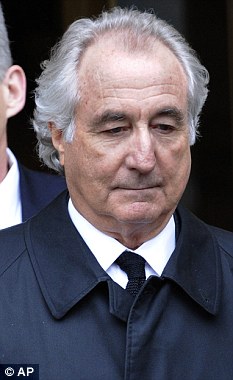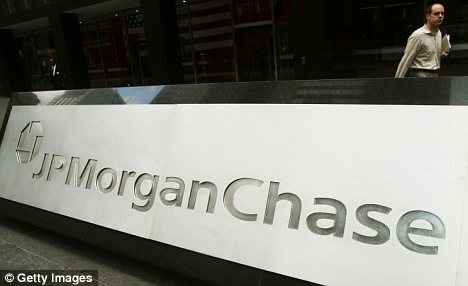
A top Wall Street bank is said to have suspected Bernie Madoff was a crook more than 18 months before he was exposed as the world’s biggest swindler.
But JPMorgan Chase executives continued to do business with the financier in spite of their concerns, according to a report today in the New York Times.
The paper quotes court documents filed by Irving Picard, the trustee trying to recoup Madoff’s ill-gotten gains for cheated investors, claiming $1billion in fees and profits from the banking giant.
Mr Picard also wants Chase to be hit with a $5.4billion bill for damages for ‘aiding and abetting Madoff’s fraud.’
The lawsuit is the latest bombshell is the bid to recover billions looted from investors by Madoff, who is now serving a 150-year prison sentence.
To date, Mr Picard has collected about $10billion through settlements and the sales of Madoff’s assets.
According to the documents, a senior Chase executive sent an email to colleagues in 2007 explaining that a colleague ‘just told me that there is a well-known cloud over the head of Madoff and that his returns are speculated to be part of a ponzi scheme’.
Another top private banking executive was said to be steering clients away from the tainted investment firm because his ‘Oz-like signals’ were ‘too difficult to ignore’.
The Times claims that as long ago as February 2006, a Chase risk analyst told his bosses that dividend returns for a Madoff feeder fund did not add up and were much better than they should have been.
But the bank still allowed Madoff to move billions of dollars worth of investor’s cash around his Chase bank accounts until until his arrest in December 2008.
By that time, claimed the Times report, Chase had withdrawn all but $35million of the $276million it had invested in Madoff’s hedge funds.

The bank ‘only had to glance at the bizarre activity’ in Madoff’s accounts ‘ to realise that Madoff was not operating a legitimate business,’ the trustee said in court papers.
A spokeswoman for the bank said it would defend itself ‘vigorously’ against the trustee’s ‘unfounded claims.’
She said in a statement that the lawsuit was ‘based on distortions of both the relevant facts and the governing law. Contrary to the trustee’s allegation, JPMorgan did not know about or in any way become a party to the fraud orchestrated by Bernard Madoff.
‘At all times, JPMorgan complied fully with all laws and regulations governing bank accounts, including the regulations invoked by the trustee.
‘In arguing otherwise, the trustee has misstated both the facts that JPMorgan has presented to him and the requirements imposed by federal law,’ the statement added.
RELATED ARTICLES
- The end of Transgender Psychopathy: Corporate America is Finally Realizing that 'Woke' is Bad for Business
- Americans tell CEOs: Drop the Woke and get back to Business
- Elite Banker Shapeshifts Into Transgender-Genderless Dragon with AIDS
- Golden Visa Portugal: PR Opportunities for Entrepreneurs and Investors
- Monopolies Are Becoming the Norm Even in Niche Parts of the US Economy











